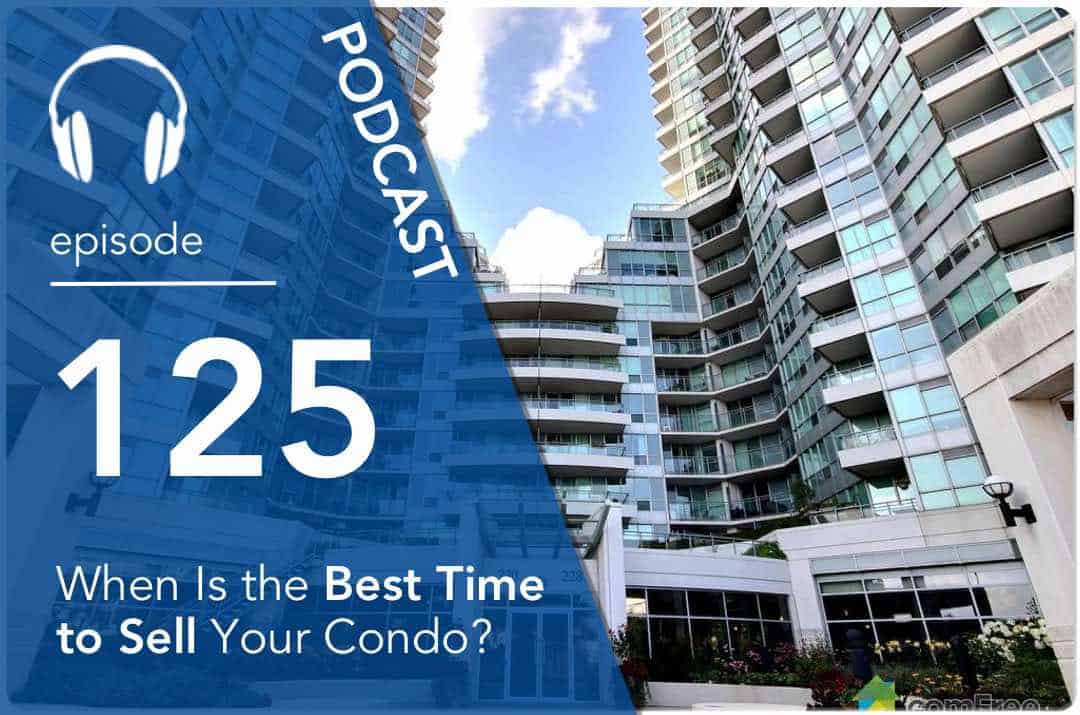When Is the Best Time to Sell Your Condo?

When is the best time to sell your condo? How long should you hold your condo before selling it? Is it better to flip it right away, or hold it for 20 years? In this episode, Andrew la Fleur breaks down the different options investors have for selling their condo and shares his formula for the optimal time to sell.
EPISODE HIGHLIGHTS
1:35 Assign the condos.
3:13 Major negatives towards assignments.
4:20 It’s very hard to sell an assignment in a slow market.
6:23 What if you sell it immediately after completion?
7:15 CRA is going to kill you on the HST fees.
8:33 What if you close on the condo, rent it out for one year, and then sell it?
10:07 Downside if you’re selling an asset while it’s still really on the way up.
11:17 Should I hold it for 20,25 years, or until I die, essentially?
12:17 Condos are commodities.
13:07 The best time to sell your condo.
Related Links
Click Here for Episode Transcript
Andrew la Fleur: When is the best time to sell your condo? How long should you hold your condo until you sell it? We’ll answer these questions on today’s episode, stay tuned.
Announcer: Welcome to the True Condos Podcast with Andrew la Fleur. The place to get the truth on the Toronto condo market and condo investing in Toronto.
Andrew la Fleur: Hi, welcome back to the show. Thank you so much for listening, I really appreciate your support. As I said in the intro, today we’re going to talk about when is the best time to sell your condo. We talk a lot about when is the best time to buy a condo, but we don’t often look at this subject. That is, when is the best time to sell. Also, a lot of investors who are new and getting into the game are thinking about what’s the best thing to buy and when do you buy it? Not a lot of people are thinking ahead and thinking when should I be selling, or what’s the plan for selling the property? When is the ideal time to sell it, how long should you hold a condo before selling it, and so on? We’re going to look at different options. We’re going to go through sort of the four or five different options, different answers to that question, and talk about the pros and cons to each of them before I finally reveal sort of my answer to this question and when I think is the best time to sell.
The first one is, you can … When is the best time to sell? The first answer is to actually assign the condos. When you assign the condo, in case you aren’t familiar with assignment. Assignment is when you are selling the property before the building is even complete. In effect, you’re flipping the contract. You’re not actually selling any real estate, you’re flipping the contract that you’ve signed to another purchaser before the building is even finished. You’re not closing on the property, you’re not getting a mortgage, you’re certainly not becoming a landlord in a case like this. Now at first glance, it might seem like a great way to go and a lot of first time investors, that’s what they’re thinking is. They hear stories of people flipping condos, buying something and then selling it for a profit a couple years later without even closing on it and making a good return.
While there are occasionally stories like that, what you don’t hear are the stories of the people who tried to sell my assignment, but who were not able to. Well then, what do those people do? Because it’s not a guarantee, that’s for sure, that you can always sell your condo by assignment. Selling by assignment is much more difficult than selling as a resale property, and so you never want to count on that as your plan A. I always say that you can use an assignment as a plan B in case your plan A of closing on it and renting it out doesn’t work. Other than that, there’s some major negatives towards assignments. The big thing is that the CRA really does not like assignments. I’ve done other podcasts on this subject and you can listen to those episodes. I’ll include a link to those in the show notes.
The CRA really doesn’t like assignments. Obviously, it’s harder for the CRA to track down assignments when people are flipping contracts to one another, it’s harder for them to know who owes them what. Obviously, they don’t like that and they want to make sure they always get their money, and so they’re actively looking for ways to discourage and crack down people from doing assignments. That being said, assignments do happen all the time and if you follow the rules and do things carefully, you have no reason to worry about the CRA or anything like that. Fact of the matter is, a lot of people over the years have cheated out of their taxes for lack of a better term, they’re cheating out of their taxes in many cases and the CRA is looking to close all these loopholes around assignments.
The other thing is, it’s very hard to sell an assignment in a slow market. Now we don’t usually talk about slow markets much here, because the market has been so good and so strong, especially lately. It is a lot easier to sell an assignment in a hot market when there’s just a lot more buyers floating around looking for property, it’s easier to get a deal together on an assignment. What do you do if you buy it today and then three, four years from now nobody has a crystal ball if the market is slow when you’re looking to do the assignment? That can be very challenging to do that. Again, you’re going to have to close on the property in that case, or you’re going to be in default of your contract, and you don’t want that.
The other thing about assignments is again, going back to the CRA, is you’re basically going to be taxed as income, as opposed to, a capital gain. Now again, I’m not an accountant, I’m not here to offer you accounting advice, you need to talk to your own accountant about it. Essentially, in most cases probably you’re looking at, if you do sell by assignment, you’re looking at having to pay that as income. The CRA is probably going to look at you and say, “You are in the business of investing and selling in real estate. That is your business or this was your intention from the start to never actually close on the property in the traditional sense,” and they’re going to say, “You got to pay us on the profit as income, as opposed to, a capital gain.” Which, a capital gain is what you would be paying in most cases when you’re selling a normal piece of real estate and not an assignment. That is what I have to say about assignments.
Now let’s jump ahead, let’s keep moving to the next possible option of, when is the best time to sell your condo? We looked at selling it before completion, now let’s talk about what if you sell it immediately after completion? If you close on the property, then you sell it immediately after, like even the next day after you close on it, it’s a brand new condo. Now in this case, the advantages would be that you can basically advertise it and sell it as a brand new, never lived in property. You don’t have to become … You’re not a landlord, you’re not dealing with any tenants, you’re just closing on it and selling it, you’re not renting it out. Now the cons with this would be that you’re going to pay all the closing costs, you’re going to pay all the occupancy fees, you’re not generating any income, because you’re not renting it out.
The biggest thing here, again, going back to the CRA yet again, is that the CRA is going to kill you on the HST fees. If you are renting out your property and you’re holding it for a minimum of a year, then you can qualify for the HST rebate, which is a significant amount of money. If you don’t rent it out, if you just leave it empty and then you go and sell it, CRA’s going to say, “You do not qualify for that rebate. It’s going to cost you as much as $30,000 of money that you’re not going to get back.” Unless you’re making an extraordinarily huge, hundreds of thousands of dollars of profit, that extra $30,000 that you’re going to lose is basically making this option a non-starter for most people. Still, I do see every month, you still see properties coming up for sale on the market that were clearly never lived in and people are selling them on the MLS, and those people are just making a huge mistake, and they’re going to get potentially hit with a major tax bill from the CRA. Don’t do that, don’t do that option.
Let’s move on to option number three, when is the best time to sell? Option number three would be, well what if you close on the condo, you rent it out for one year, and then you sell it? Rent it out for a year, get a lease for a year, and then you sell it. Well the advantages there are, you don’t have to worry about the HST, as we just talked about. If you have it for at least a year, you will get that HST rebate back, no worries there, and you’re not out of pocket that huge expense. You do have to pay your closing costs and get a mortgage and everything, but those closing costs that you’re incurring are going to be counteracted, or washed out by the principal paydown that your tenant is going to be paying your mortgage down for that first year, and probably the property’s going to appreciate in value. Again, maybe it’s 5, 10%, whatever it might be over that first year as well.
That’s not a concern there and it’s very easy to be a landlord for just one year. It’s a short period of time, most people, even if they’re deathly afraid of being a landlord for whatever reason, there’s no need to be, but some people are. Being a landlord in a brand new condo for one year is really very easy to do and there’s very little work involved in that. When you’re selling it, you’re still advertising and selling it as pretty much a brand new property, it’s only a year old, and that carries a lot of appeal with buyers. Now the big downside of doing this is that you’re sort of selling it … You’re selling an asset while it’s still really on the way up. It’s still not anywhere near its peak, so to speak. The property is in very high demand, it’s still considered to be a very new property.
Renters really would want to live in that new property, the maintenance fees are still very low, it’s very attractive for buyers to buy in that property as well, and you just got a tenant in there most likely, and the tenant most likely is still there, so there’s no work required. You’re just cashing checks every month, your mortgage is being paid down, and the property’s likely still appreciating. You’re really selling it at a bad time in that sense. You’re selling it at a peak while things are still looking up and doing very well. For that reason, that is an okay time to sell, but it’s not as good … It’s not a perfect scenario.
The next option, if you’re not going to hold it just for one year and sell it, well another question that people ask me is, “Well, how about if … Should I hold it for 20 years, or 25 years, or should I hold it until I die, essentially?” The answer to that again, is no, that is not an ideal scenario either. You don’t want to hold the property too long, because if you’re holding a condo for 20 years plus, you’re … That condo is going to be a very old condo by that point in time. Yes, you will have enjoyed a lot of years of great cash flow and your amortization schedule on your mortgage will be such that you’ll be really getting a lot of principal in your pocket every month, and lower, and lower interest payments as time goes on, because that’s how mortgage amortization schedules work, which is good. You don’t want to be holding an old condo.
The reason for that is something that we talk about a lot as well. That is, condos are commodities, condos are commodities. When it comes to condos, you always want to have the newest … People always want to have the newest and latest thing. The newest and most recently built condos are always the most in demand, they always have the highest appreciation rates, they have the most number of people wanting to rent in them and buy in those buildings. Newer is better when it comes to condos. You don’t want to own an old condo. Okay, so that brings me to the final option, and this option is my preferred and advised option for people who ask me, “When is the best time to sell your condo?” The best time to sell your condo, in my opinion, is approximately the seven year mark. When a condo is seven years old approximately, that is the best time to sell your condo.
Condos that are less than seven years old, they’re still considered newer condos, their demand levels are still high enough, so there’s always people wanting to live in those buildings. They’re not considered old yet, they don’t have that stigma of being an old building attached to them. That’s the big thing there. The other thing is, the maintenance fees tend to be okay still up until about seven years. Once you get beyond seven years in most buildings, the maintenance fees tend to be shooting up quite high, quite a bit higher, significantly higher than the average new building. Again, that contributes to the decrease in desirability from renters and buyers perspective of that building. Another big factor of why that is, is because a Tarion warranty lasts for seven years. Tarion warranty, building warranty, lasts for seven years. After seven years, there is no more warranty on the building. If there are any issues, you can’t go back to the builder as a building and you have no case there, you’re on your own completely.
Big capital expense items start to be needed to be done in around that seven year mark or so. You start talking about things like new roof, new windows, mechanical systems needing more maintenance or replacement in some cases. There seems to be something about that seven year mark for condos, where that seems to be the point in time where a condo shifts from being considered a newer building to being an older building. We see this time and time again. The answer then for this question in my opinion is when you should sell a condo? It’s around that seven year mark. Now it’s not a hard and fast rule, there may be exceptions, there may be … It obviously depends on your personal financial situation and what other opportunities you’ve got, but this is a rule of thumb sort of a thing here.
There may be cases where you have … There are some buildings that are older than seven years that maybe are 10 or 12 years old that are still in prime, prime locations, they still have very high demand to live in them, they’re well run buildings. The maintenance fees are reasonable, the structure is in good shape, it was built by a quality builder in the beginning. The common area in many spaces have been updated and renovated so that they still are looking good compared to the brand new buildings next door. Those are the buildings that you might want to hold onto for longer than seven years, but in most cases that seven year mark is what you want to be watching for as a good time to think about selling the condo, taking the profits, taking the proceeds, and moving it into a brand new building, or pre-construction build and just continuing that cycle.
Buying at pre-construction, closing on it, renting it out for seven years, selling it, taking the profits and buying more condos. Just rinse and repeat. All right. There you have it, that is the episode for this podcast for today. Hope you enjoyed that, hope you found that useful. If you did, why don’t you go ahead and share this episode with somebody that you know that could benefit from it. Okay, until next time, I hope you’re having a great week and we’ll talk to you soon.
Announcer: Thanks for listening to the True Condos Podcast. Remember, your positive reviews make a big difference to the show. To learn more about condo investing, become a True Condos subscriber by visiting truecondos.com.






